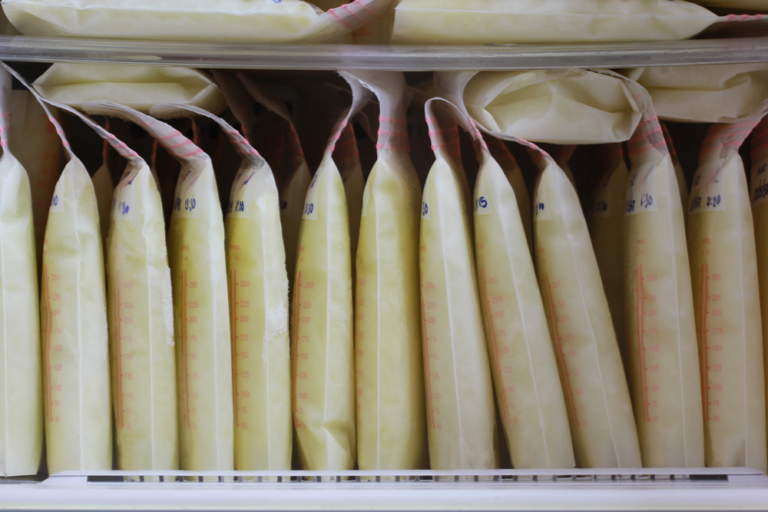Can You Breastfeed While Sick? What Moms Need to Know

As a new mom, you might worry about breastfeeding when you’re not feeling well. But the truth is, breastfeeding while sick can be good for both you and your baby. A 2023 CDC report found that breastfed babies of sick moms visit the ER 70% less for respiratory illnesses. This shows how breastfeeding while sick can help keep your baby healthy.
Breastfeeding while sick offers many benefits for both moms and babies. It provides antibodies and other protective factors that help fight off illnesses. The Centers for Disease Control and Prevention (CDC) says it’s okay to breastfeed even if you have COVID-19. They also note that cold and flu viruses don’t pass through breast milk.
Key Takeaways
- Breastfeeding while sick can be beneficial for both the mother and the baby.
- Breast milk contains antibacterial and antiviral elements that can help protect the baby from illness.
- Breastfeeding while sick can provide antibodies and immunological factors that help protect babies from illness.
- Current recommendations from the CDC state that breastfeeding is safe even if the mother has COVID-19.
- Breastfeeding can reduce the risk of ear infections by approximately 50% and decrease the incidence of diarrhea by 64% in infants.
- Breastfeeding can promote healthy brain development, with studies indicating a 20% increase in IQ points for breastfed children.
- Breastfeeding while sick is a great way to provide your baby with the best possible start in life, and the benefits of breastfeeding can last a lifetime.
The Safety of Breastfeeding During Illness
Breast milk safety is a big worry for moms who are nursing while sick. The World Health Organization says breast milk is safe for babies, even when the mom is unwell. The antibodies in breast milk protect the baby from getting sick and lower the chance of infection.
There are many benefits to breastfeeding when you’re sick. Breast milk has antibacterial and antiviral properties that fight off illness. It also shields babies from many respiratory diseases, like the flu. The flu spreads mainly through respiratory droplets, not through breast milk.
Some important things to remember when breastfeeding while sick include:
- Infants who are breastfed are less likely to get infections, including serious respiratory illnesses, than those who aren’t.
- Women who get the flu vaccine while pregnant or breastfeeding pass on antibodies to their babies through breast milk.
- It’s very important to keep hands clean; moms should wash their hands thoroughly with soap and water before expressing milk.
In conclusion, the safety of breastfeeding during illness is well-studied. With the benefits of breastfeeding while sick and the low risk of passing on illnesses through breast milk, moms can be confident in their choice to keep nursing even when they’re not feeling great.
Common Illnesses and Breastfeeding
As a breastfeeding mom, it’s key to know that most common illnesses, like the flu and colds, don’t pass through breast milk. The Centers for Disease Control says breastfeeding while sick can give babies protective antibodies. This helps them fight off illnesses better. A 2023 CDC report shows breastfed babies of sick moms have 70% fewer ER visits for respiratory illnesses.
Some important things to remember when breastfeeding while sick include:
- Frequent nursing can prevent engorgement and help keep milk supply up during illness
- Breast milk is more hydrating for babies than plain water, which is good during stomach bugs or diarrhea
- Certain medications can affect milk supply, like cold medicines with pseudoephedrine, high-dose steroids, and high doses of antihistamines like diphenhydramine
It’s important to protect your baby from getting sick. Wash your hands often and avoid close contact. By doing this and continuing to breastfeed while sick, you can keep your baby healthy and strong. The American Academy of Pediatrics (AAP) says only two things are true contraindications to breastfeeding in the US: infants with classic galactosemia and mothers with HIV. For common illnesses like colds, influenza, or Covid-19, the AAP and World Health Organization don’t suggest stopping breastfeeding.
In summary, breastfeeding while sick can be safe and healthy for both mom and baby. By understanding the risks and taking precautions, mothers can keep providing their babies with the nutrients and antibodies they need to grow well.
How Different Types of Infections Affect Breast Milk
It’s key to know how infections impact breast milk quality and safety. Most viral infections, like the flu, don’t pass through breast milk. This is because breast milk has antibodies that protect babies from getting sick.
Studies show that breastfed babies are less likely to get COVID-19 than non-breastfed babies. Also, antibodies for COVID-19 have been found in the breast milk of parents with the virus and those who got vaccinated. This means breastfed babies might get some immunity.
Viral infections usually don’t go through breast milk. But, bacterial infections like mastitis can make breast milk less safe. Fungal infections, like thrush, can also harm the breast and nipple area.
Understanding the Impact of Infections on Breast Milk
The Academy of Breastfeeding Medicine says antibodies against infections start right away when a nursing parent gets sick. These antibodies are in the breast milk. This shows why it’s important to keep breastfeeding even when sick. It helps babies get the antibodies they need to fight off infections.
Key Facts About Breast Milk and Infections
- Breast milk contains antibodies that help protect babies from infections
- Viral infections, such as the flu, do not typically pass through breast milk
- Bacterial infections, such as mastitis, can affect the quality and safety of breast milk
- Fungal infections, such as thrush, can affect the breast and nipple area
In summary, knowing how infections affect breast milk is vital for nursing parents. By breastfeeding even when sick, parents give their babies important antibodies. This shows how vital breast milk is in keeping babies safe from viruses and other infections.
Protecting Your Baby While Nursing During Illness
As a breastfeeding mom, it’s key to protect your baby from getting sick. The World Health Organization says moms can keep their babies safe by washing their hands often and staying away from them when sick. This helps lower the chance of your baby getting an infection.
When breastfeeding while sick, keeping clean is very important. Make sure to wash your hands with soap and water before touching your baby or expressing milk. If you can’t find soap, use hand sanitizer with at least 60% alcohol. Also, wear a mask when you’re close to your baby, like when you’re feeding, to cut down on the risk of passing on the illness.
Here are some important tips for protecting baby from illness:
- Washing your hands frequently with soap and water
- Avoiding close contact with your baby when you’re sick
- Wearing a mask while nursing or caring for your baby
- Expressing and storing breast milk safely if you need to be separated from your baby
By following these steps and taking the right precautions, you can keep your baby safe and healthy while breastfeeding while sick. Remember, breastfeeding gives your baby important antibodies and immune functions. So, it’s very important to keep nursing whenever you can.
Can You Breastfeed While Sick? Understanding the Medical Perspective
From a medical standpoint, breastfeeding while sick is usually okay. It’s good for both mom and baby. The Academy of Breastfeeding Medicine says moms should keep breastfeeding unless they have a serious health issue.
Research backs this up. It shows breastfed babies get sick less often, even as young as 1 year old.
When you’re sick, your body makes antibodies that go into your milk. These antibodies protect your baby from getting sick. The Academy of American Pediatrics says you can keep breastfeeding even if you have a cold or flu. This is because your milk doesn’t pass on viruses to your baby.
Also, your baby gets your antibodies to fight off the illness. This can make their sickness less severe.
It’s important for moms to know what doctors think about breastfeeding when you’re sick. Doctors can give you advice and support. They help you make the best choices for your health and your baby’s.
- Drink lots of water, at least 10 eight-ounce glasses a day, when you’re sick.
- Take probiotics to fight off the bad effects of antibiotics, which can cause thrush in babies.
- Try natural remedies like raw honey, apple cider vinegar, and garlic to boost your immune system and lessen your symptoms.
What Healthcare Providers Recommend
Doctors are key in helping moms who are breastfeeding and sick. They can tell you how to handle your symptoms, suggest safe medicines, and offer support. Working with your doctor ensures you get the best care for you and your baby.
When to Seek Medical Advice
Even though breastfeeding while sick is usually okay, there are times when you should see a doctor. This includes:
- Severe symptoms, like a high fever or trouble breathing.
- Signs of infection, like redness or swelling in your breast.
- Worries about your baby’s health, like a fever or trouble eating.
Knowing the medical view on breastfeeding while sick helps moms make smart choices. It ensures they get the right care for themselves and their babies.
Managing Your Recovery While Breastfeeding
When you’re breastfeeding while sick, it’s key to manage your recovery well. Medela says rest, hydration, and a balanced diet are vital. Taking care of yourself helps your body heal and keeps your baby nourished.
Keeping up your milk supply is important. Dehydration and fatigue can lower milk production. To boost it, pump for about 15 minutes every couple of hours. Pumping both breasts at once is best for milk production.

- Drink plenty of water and juice to stay hydrated
- Avoid caffeinated beverages, as they can dehydrate the body
- Eat a balanced diet to provide your body with the necessary nutrients
- Get plenty of rest to help your body recover from illness
By following these tips, you can keep breastfeeding while sick. This way, you ensure your baby gets the nutrients they need. Remember, breastfeeding can protect your baby from illness with antibodies in the milk.
Safe Medications for Nursing Mothers
As a breastfeeding mom, knowing which medicines are safe is key. The World Health Organization and the American Academy of Pediatrics (AAP) offer guidelines. They help find safe medications that won’t harm the baby.
Cold and flu viruses, like COVID-19, can’t pass to breastmilk. But, some medicines can get into breastmilk, in small amounts. The AAP says most over-the-counter cold meds are okay for breastfeeding moms. For example, tiny amounts of ibuprofen or acetaminophen in breastmilk are safe for fever and headache.
Here are some safe medications for nursing mothers:
- Acetaminophen
- Ibuprofen
- Nasal sprays containing oxymetazoline, triamcinolone, and/or fluticasone
- Dextromethorphan and guaifenesin
Always talk to a healthcare provider before taking any medicine while breastfeeding. They can give you advice tailored to your situation. This helps you make choices that are good for both you and your baby.
Most medicines are safe to take while breastfeeding without harming the baby. But, it’s wise to be cautious. Always check with a healthcare provider before taking any medicine.
Maintaining Milk Supply During Illness
As a breastfeeding mom, keeping your breast milk supply up during illness is key. Medela says to breastfeed often and drink lots of water. Also, rest well and eat a balanced diet to help make milk.
To keep up milk supply, empty your breasts as much as you can. This is important when your baby isn’t eating much. Pump every two to three hours during the day and take a six-hour break at night. Double pumping can save time and boost milk production.
- Drinking plenty of fluids
- Eating three healthy meals a day
- Having high-calorie, healthy snacks
- Pumping more frequently if milk supply is low
By following these tips, breastfeeding moms can keep their breast milk supply up during illness. This ensures their baby gets the nutrients they need.
Special Considerations for Specific Conditions
As a breastfeeding mom, knowing about certain conditions is key. These can impact breast milk and your baby’s health. For example, mastitis can be tough to handle while nursing. The World Health Organization advises mothers with specific conditions to protect their babies.
Mastitis, an inflammation of the breast, needs extra care. It’s caused by infection or other factors. Moms with mastitis should keep nursing, as it helps clear the blockage and lowers infection risk. But, it’s important to wash hands often and avoid close contact to prevent infection.
Flu and common cold can also affect nursing moms. The CDC suggests that women with the flu should express milk but avoid direct contact with their baby. Moms with HIV or tuberculosis might need to take extra precautions or avoid nursing.
It’s vital for nursing moms to know about these conditions and take steps to protect their babies. By understanding the risks and taking action, moms can keep nursing safely. This way, they can give their babies the many benefits of breast milk.
Supporting Your Own Health While Nursing
As a breastfeeding mom, taking care of yourself is key. Medela says eating well, staying hydrated, and resting are important. This helps you keep nursing safely and effectively.
For nutrition tips when you’re sick, eat whole foods, fruits, and veggies. They boost your immune system. Drinking lots of water and herbal teas helps your body heal. Resting when you need to is also vital for your health.
Some important nutrition tips for breastfeeding moms include:
- Eating foods rich in protein, such as lean meats and fish
- Incorporating healthy fats, like nuts and seeds, into your diet
- Consuming complex carbohydrates, such as whole grains and fruits
By focusing on your health and following these nutrition tips, you can keep nursing safely. This gives your baby the best start in life. Always talk to your healthcare provider if you have health concerns.
When to Consider Temporary Alternatives
As a breastfeeding mom, you might face times when you need temporary alternatives to nursing. The World Health Organization says you might need to use formula or donor milk if you’re very sick or in the hospital. Always talk to a healthcare provider before trying any temporary alternatives.
Here are some times when you might need to use temporary alternatives:
- Severe illness or hospitalization
- Certain infections, such as tuberculosis or measles
- Undergoing radiotherapy or chemotherapy
- Herpes lesions on the breast
In these cases, freezing your breast milk can help caregivers feed your baby. It’s key to keep clean to avoid spreading germs. Wash your hands before and after feeding, and after coughing or sneezing. This way, your baby gets the nutrients they need, even if you can’t breastfeed.
Also, breastfeeding can help you and your baby stay healthy. It can cut down on sick days and doctor visits. Breast milk has special powers that fight off colds, flu, and more. Keep nursing to protect your baby from getting sick.
| Benefits of Breastfeeding | Temporary Alternatives |
|---|---|
| Provides antibodies that reduce the risk of illness | Formula or donor milk |
| Contains antibacterial and antiviral elements | Expressed and frozen breast milk |
In short, while breastfeeding is usually the best choice, there might be times when you need something else. Knowing your options and taking care can help your baby stay healthy, even if you can’t breastfeed.
Conclusion: Embracing Your Body’s Natural Ability to Protect Your Baby
When you’re caring for your baby and feeling sick, remember the power of breastfeeding. Your body makes milk full of antibodies to keep your baby safe. This milk also gives your baby important nutrients.
By breastfeeding, you’re not just feeding your baby. You’re also helping their immune system grow strong. This sets them up for a healthier life ahead.
The American Academy of Pediatrics (AAP) and the World Health Organization (WHO) say to breastfeed your baby for the first 6 months. They also suggest breastfeeding along with solid foods for up to 2 years or more. Trust in your body’s ability to protect your baby, even when you’re not feeling well.






